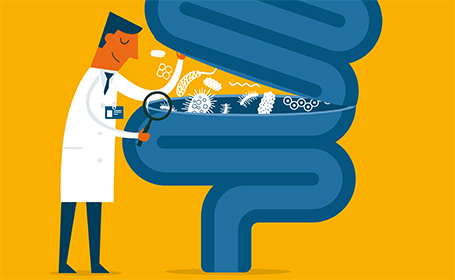
The importance of a bowel cancer screening
Dr Simon Campbell is a consultant gastroenterologist and an accredited national bowel cancer screening colonoscopist at The Alexandra Hospital. He highlights the benefits and the importance of screening and surveillance for bowel cancer
When caught early, survival rates are very high, yet bowel cancer is still the second most common cause of cancer deaths in the UK. Screening and surveillance are two of the most important tools we have to try and diagnose bowel cancer as early as possible.
It's also important to be aware of the symptoms of bowel cancer, and to speak to your doctor as soon as possible if you experience any of the below:
- Bleeding from your bottom
- Blood in your poo
- Any changes in your normal bowel movements that continue for three weeks or longer
- Sudden and unexplained weight loss
- Extreme tiredness
- Pain or lumps that you can feel in your tummy
What is the difference between screening and surveillance?
Bowel cancer screening
Screening is where we identify and test patients who have no symptoms but who may be at higher risk of developing bowel cancer.
There are a few methods of screening that can be used. Your consultant will help you decide which is the best one for you:
Stool testing
This test works by detecting small traces of blood hidden in your faeces (poo), which can be a sign of bowel cancer
Colonoscopy
By inserting a tiny camera on a long flexible tube through your rectum (back passage), your consultant can examine your bowel and spot potential signs of disease, including polyps. Photographs can be taken and small samples removed to be tested
Virtual colonoscopy
This option uses a CT scanner to create 2D and 3D images of your bowel and rectum to spot potential signs of disease, including polyps
Flexible sigmoidoscopy
This is similar to a colonoscopy but uses a video camera, enabling your consultant to see into the lower part of the bowel and identify potential signs of disease
The aim of screening is to detect bowel cancer at an early stage, or even to identify pre-cancerous growths that can be dealt with before cancer develops.
Bowel cancer surveillance
Screening may identify polyps in your bowel. These are non-cancerous growths that may go on to become cancer. Surveillance is where patients with a history of polyps have regular colonoscopy tests - normally every one-to-five years.
In the UK, 1 in 15 men and 1 in 18 women will develop bowel cancer in their lifetime, making it the third most common cancer in the UK.

What are the risks factors for developing bowel cancer?
In the UK, 1 in 15 men and 1 in 18 women will develop bowel cancer in their lifetime, making it the third most common cancer in the UK.
Risk factors for bowel cancer include:
- Family history of bowel cancer
- Smoking
- Being overweight or obese
- Excessive alcohol consumption
- Not getting enough exercise
- Not eating enough fibre
- Eating too much processed meat
- Age
Bowel cancer is most prevalent in people over the age of 60, and 44% of bowel cancer cases are in people over 75.
If you are aged 55 or over and have not been invited to a bowel scope screening test, you may want to speak to your doctor about having a test. This is especially true if you identify with any of the above factors that put you at risk of bowel cancer.
You could also enquire about a home testing kit, also known as a FIT or FOB test. You get sent the screening kit in the post and then send it off to be tested in a laboratory.
Why are surveillance and screening important?
We know that bowel cancer is very treatable and potentially curable if caught early, and screening and surveillance make that more likely.
One thing that can be identified is polyps. Polyps are like warts that grow on the lining of the bowel. Over a period of around ten years, they can turn in cancer. Removing polyps is a straightforward procedure that could stop bowel cancer developing.
What is colonoscopic surveillance?
You may be invited to have a colonoscopy if you:
- Have been identified as being at high risk of bowel cancer for any of the above reasons
- Have a family history of bowel cancer
- Are showing symptoms
- Have had a test that showed anything unusual that needs further investigation
A colonoscopy is where a tiny telescope is passed through your anus into the colon. It takes about 30 minutes and is usually done under heavy sedation. You should be able to go home the same day.
Screening can be performed at any age, but the benefits are really shown in patients aged 50 years and older.
At what age should I start a bowel cancer screening programme?
Screening can be performed at any age, but the benefits are really shown in patients aged 50 years and older.
However, in recent years the rate of bowel cancer in younger patients has been increasing more rapidly than expected.
Because of this, a colonoscopy may be recommended in younger patients who have a family history of bowel cancer or display particular symptoms, such as a change in bowel habits or bleeding from the back passage.
If my test shows abnormal results, what are the chances that I have bowel cancer?
If blood is found in your stool samples, this is known as a positive faecal blood test (or a positive faecal occult blood test).
If you do have a positive faecal blood test, you will be recommended a colonoscopy. But it does not mean you definitely have bowel cancer.
Only 1 in 10 people over the age of 60 with a positive faecal occult blood test will have colon cancer. Other causes of these results include haemorrhoids (piles) and bowel polyps.

Tags
How do I book an appointment?
If you're concerned about symptoms you're experiencing or require further information on this subject, talk to a GP or see an expert consultant at your local Circle Hospital.